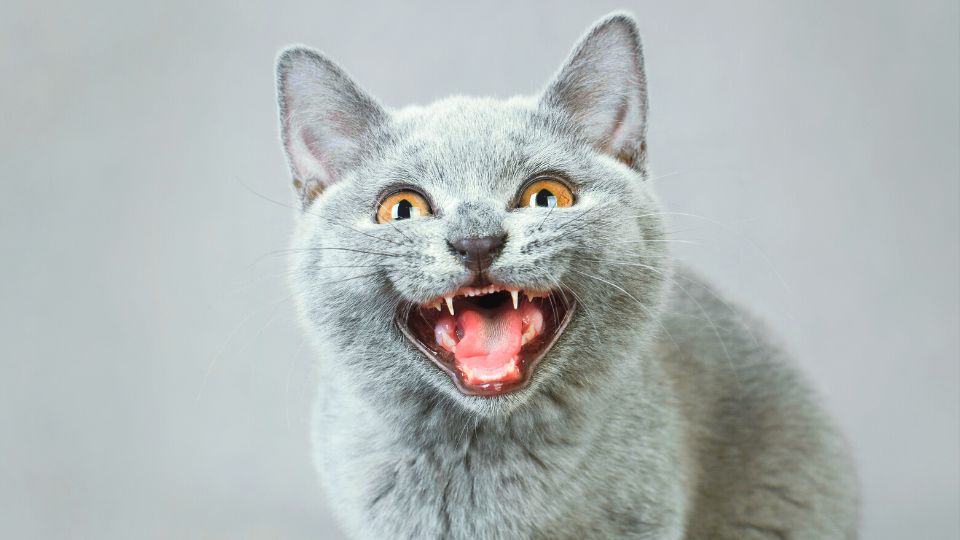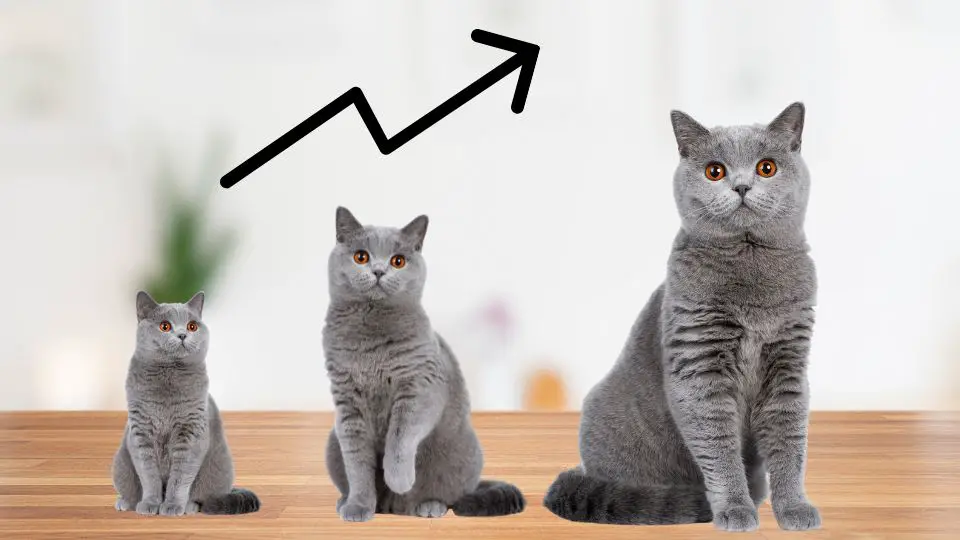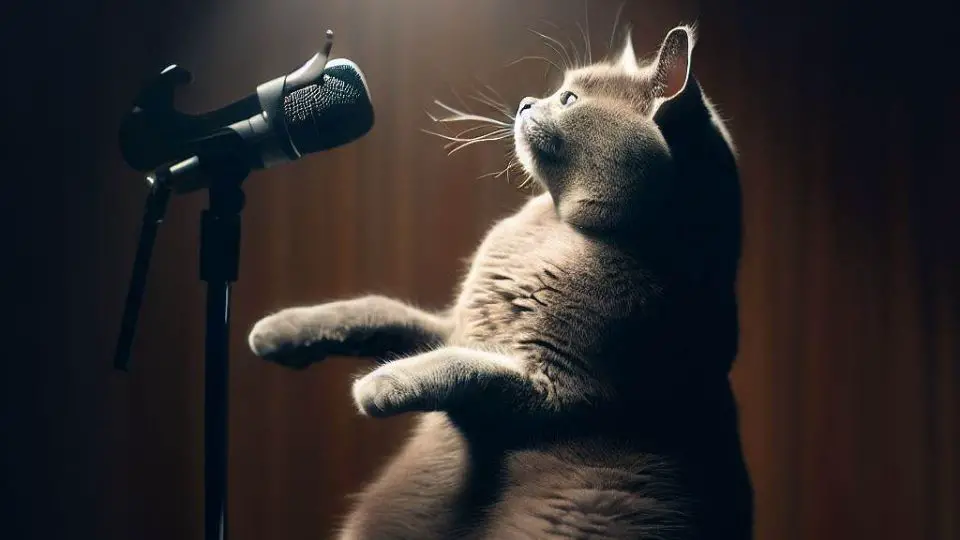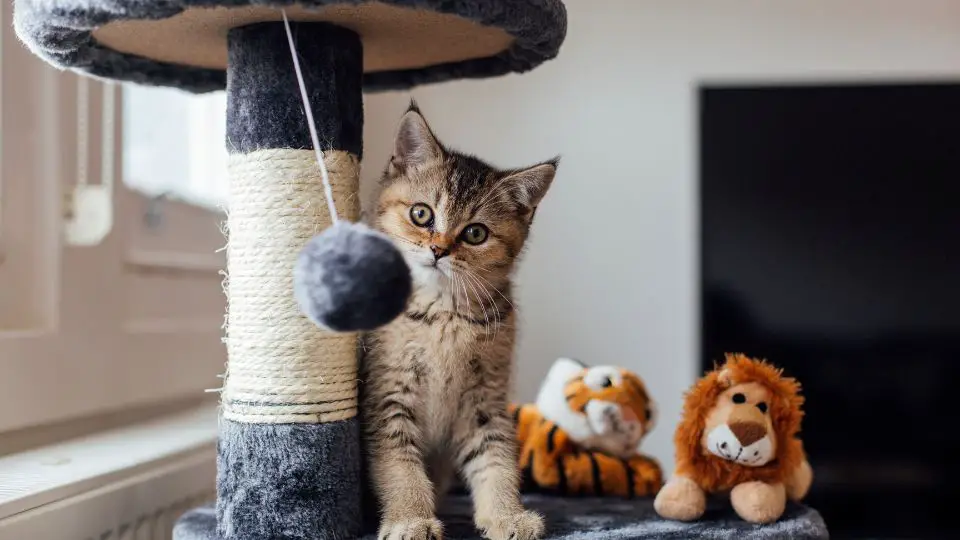If you’re considering adopting a British Shorthair cat, you may be wondering if they are a particularly vocal breed.
So, do British Shorthair cats meow a lot? The short answer is no, British Shorthair cats are not known for being particularly talkative compared to other cat breeds.
But let’s dive deeper into the reasons why.
Meowing in Cats
Cats are known for their unique vocalizations, including their meows. While some cats are more talkative than others, meowing plays an important role in cat communication.
Meowing is just one of the many ways that cats communicate with each other and with humans. While adult cats primarily meow to communicate with humans, kittens use meowing to communicate with their mothers.
Cats have a variety of meows that they use to communicate different messages. Here are some of the most common types of meows and what they mean:
- The Standard Meow – This is a friendly greeting that cats often use to get their owner’s attention or to say hello.
- The Trill – A trill is a series of high-pitched meows that cats use to express excitement or happiness.
- The Chirp – A chirp is a short, high-pitched meow that cats use to express curiosity or to get attention.
- The Growl – A growl is a low-pitched sound that cats use to express aggression or to warn of danger.
- The Hiss – A hiss is a sharp, high-pitched sound that cats use to express fear or anger.
While cats have a wide range of vocalizations, it’s important to pay attention to your cat’s individual meows and body language to understand their needs and emotions. Some cats may be more vocal than others, while others may communicate primarily through body language.
Why Does Your British Shorthair Meow a Lot
British Shorthair cats are not particularly vocal cats and tend to communicate more through body language than meows. However, some British Shorthairs may meow more than others, and the frequency of meowing can vary depending on the cat’s individual personality and needs.
Factors that can influence meowing behavior for a British Shorthair include:
Hunger or Thirst
One of the most common reasons cats meow is to express hunger or thirst. If your British Shorthair is meowing frequently, it may be a sign that they are hungry or thirsty and need food or water.
Attention-Seeking
Cats are social animals and often meow to get attention from their owners. If your British Shorthair is meowing excessively, it may be a sign that they are feeling lonely or bored and want to play or cuddle.
Medical Issues
In some cases, excessive meowing can be a sign of an underlying medical issue. Cats may meow more if they are in pain or discomfort or if they are experiencing a health problem such as hyperthyroidism or kidney disease.
Aging
As cats age, they may become more vocal and meow more frequently. This can be a sign of cognitive dysfunction or other age-related changes.
Stress or Anxiety
Cats can also meow more frequently if they are experiencing stress or anxiety. Changes in the environment, such as a move or the addition of a new pet, can trigger excessive meowing in some cats.
Understanding Your British Shorthair’s Meowing
If you’re a British Shorthair cat owner, you may have noticed that your furry friend meows frequently. While some cats are naturally more talkative than others, excessive meowing can be a sign of an underlying issue.
Understanding your British Shorthair’s meowing can help you better communicate with your cat and address any issues that may be causing excessive meowing.
How to Interpret Your Cat’s Meows
- Pay attention to the tone: The tone of your cat’s meow can give you clues about their mood and needs. A high-pitched, urgent meow may indicate hunger or discomfort, while a low, drawn-out meow may be a sign of boredom or loneliness.
- Consider the context: The context in which your cat is meowing can also provide important clues. For example, if your cat meows at mealtime, it’s likely that they are hungry. If they meow when you come home from work, they may be seeking attention or playtime.
- Observe body language: Your cat’s body language can also help you interpret their meows. For example, if your cat is rubbing against your legs and meowing, it may be a sign that they want attention or affection.
Tips for Addressing Excessive Meowing
- Provide plenty of attention and playtime: British Shorthair cats are social animals and need plenty of attention and playtime to stay happy and content. Make sure to spend time with your cat each day, playing with toys and engaging in interactive play.
- Create a comfortable environment: Cats need a comfortable and secure environment to feel safe and content. Provide plenty of cozy places to sleep and rest, and make sure your cat has access to food, water, and a clean litter box.
- Consider dietary needs: If your cat is meowing excessively, it may be a sign that they are not getting enough nutrients in their diet. Consider adjusting their diet or providing supplements to ensure they are getting the nutrients they need.
- Consult with your veterinarian: If your cat’s meowing behavior seems excessive or suddenly changes, it’s important to consult with your veterinarian to rule out any underlying health issues.
Why my British Shorthair doesn’t meow?
If you own a British Shorthair cat that doesn’t meow very much, you may be wondering if there is something wrong with them. However, remember that some cats are simply more vocal than others, and this can be due to their individual personalities and breed characteristics.
British Shorthairs are known for being a relatively quiet breed, and they tend to communicate more through body language than through vocalizations. While they may still meow occasionally, it’s not uncommon for British Shorthairs to be less vocal than other cat breeds.
That being said, if you have noticed a sudden change in your British Shorthair’s meowing behavior, you may want to consider any potential underlying issues. Aging, hearing loss, or stress and anxiety can all contribute to changes in a cat’s meowing behavior, even in naturally quiet breeds like the British Shorthair.
Are British Shorthairs talkative?
British Shorthair cats are not known for being particularly talkative compared to some other cat breeds. While they may meow occasionally, they tend to communicate more through body language than through vocalizations.
That being said, every cat is unique and may have their own individual personality and level of vocalization. So, it’s possible that your British Shorthair may be more talkative than others of its breed.
The Nature of British Shorthair Cats
The British Shorthair is known for its laid-back and friendly personality. They are often described as being calm and affectionate, making them great pets for families with children or other pets.
They enjoy being around people and are happy to spend time lounging on the couch or playing with their toys. They are also known for being independent and self-sufficient, which makes them a great choice for those who work long hours or have busy schedules.
Overall, the British Shorthair is a charming and lovable breed that makes a great pet for families and individuals alike. Their laid-back and affectionate personality, combined with their unique appearance and vocalizations, make them a true delight to be around.
Conclusion
Finally, while British Shorthair cats are not known for being particularly vocal, every cat has its own unique personality and level of meowing.
Some British Shorthair cats may be more talkative than others, but generally speaking, they tend to communicate more through body language than vocalizations. However, if you notice a sudden change in your cat’s meowing behavior, it’s always best to consult with your veterinarian to rule out any underlying health issues.
Overall, British Shorthair cats are a beloved breed known for their charming personality and unique appearance, making them a great choice for any cat lover.







